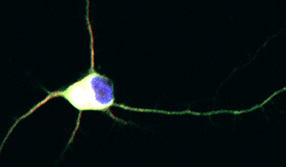Two University of Connecticut professors have won a PITCH Promising Project Award to work on developing a novel approach for repairing optic nerve damage that occurs in optic neuropathies such as glaucoma.
Ephraim Trakhtenberg and Jessica Rouge are the co-Principle Investigators for this project. Previous research by Trakhtenberg found that there are certain molecules which can stimulate the regrowth of optic nerve axons after eye injury. Axons are the extensions of the eye neurons that pass nerve impulses to the brain. When an optic nerve is damaged, these axons are irreversibly disrupted. Consequently, signals carrying visual information cannot be transmitted from the eye to the brain, resulting in blindness.
However, a problem persists with such potential treatments, which need to be delivered rapidly and sustainably to specific retinal cells – retinal ganglion cells (RGCs). The current drug delivery methods are slow and do not target many of the injured RGCs. Rouge will utilize her expertise in nanomaterials and chemistry in conjunction with PITCH funding to advance such a delivery system that will be tested by Trakhtenberg. In parallel, Trakhtenberg will use PITCH funding to investigate novel compounds with predicted therapeutic potential, provided for the project through the Atomwise AIMS Award to him. Ultimately, the researchers envision that a combination of the novel therapeutic molecules and the advanced delivery system will lead to the development of a therapeutic approach for treating optic neuropathies.
Trakhtenberg is an assistant professor of neuroscience at UConn Health. He received his Ph.D. in neuroscience from the University of Miami Miller School of Medicine, and completed a postdoctoral fellowship at the Boston Children’s Hospital, Harvard Medical School. His lab’s research focus is to understand the molecular mechanisms of neuronal development and regeneration and to use this knowledge to develop approaches for repairing injured central nervous system circuits.
Rouge is an assistant professor in the UConn Department of Chemistry. She received her Ph.D. from the University of Colorado in chemistry in 2012 and completed her postdoctoral work at Northwestern University. Her research focuses on understanding how enzymes and nucleic acids can be used to engineer highly specific responses in chemical and biological systems.



